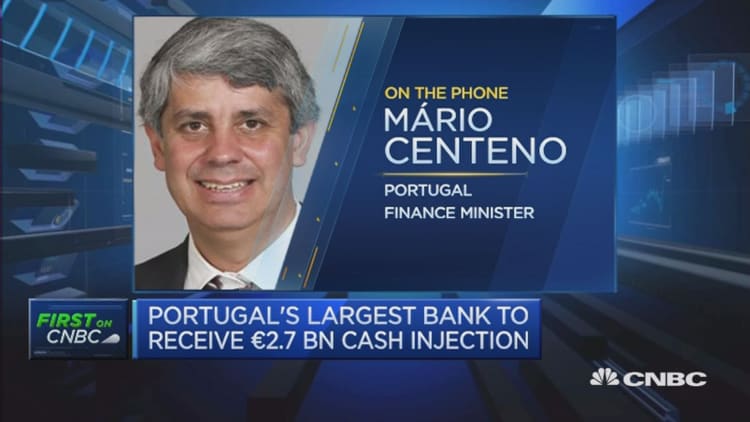
Portugal's plan to pump nearly 5 billion euros ($5.6 billion) into its biggest bank by assets is "another big step towards the stabilization of the Portuguese financial system," the country's financial minister told CNBC on Thursday.
The European Commission (the executive wing of the EU, of which Portugal is a member) and Portugal have agreed in principle to the recapitalization of state-owned Caixa Geral de Depósitos.
"This is another big step towards the stabilization of the Portuguese financial system. This is a ... milestone in the process and we are looking for business plans. I think it will create necessary turnout not just in Caixa but also in the Portuguese financial system," Mario Centeno told CNBC.
The plan was agreed late on Tuesday afternoon. It would see Portugal pump up to 2.7 billion euros of state funds into Caixa, transfer 500 million euros of its ParCaixa shares to Caixa and convert 960 million euros of contingent convertible bonds into equity.
Meanwhile, Caixa will issue highly subordinated debt worth around 1.0 billion euros that will be compliant with regulatory capital ratios designed to bolster banks' ability to withstand financial shocks.
This follows negotiations with Brussels officials, aimed at ensuring the plan is not viewed as state-aid to the bank, which would add to Portugal's problematically high budget deficit.
Although the government would put money into the bank, the hope is that the returns for the state would outweigh the cash injection.
Portugal's budget deficit ran to 4.4 percent of gross domestic product (GDP) in 2015, far above the 2.7 percent target agreed with the European Commission. The Commission opted against fining Portugal — or Spain, which missed its own target — but the country must still aim to get its deficit below a threshold of 3 percent of GDP.
"First it is very important, our relationship with the European Commission, and it is working very very well as the situation improves. We are looking at a very constructive relationship with Brussels," Centeno told CNBC.
"Second, on the budget front, we are going to post data up to July in the budget and we see contained public expenditure, a big reduction in deficit vis-a-vis last year," he added.

The European Commission forecasts the Portuguese economy will grow by 1.5 percent in 2016 — flat on 2015 — and 1.7 percent in 2017.
"I think Portugal is now also making a turnaround in terms of its growth prospects. We do have information from the macro scenario pointing towards very good data," Centeno told CNBC.
Private sector indebtedness is a major problem in the Portuguese economy, which is one of the most indebted in the EU. Some say efforts to tackle the issue have waned since Portugal's Socialist Party took power at the end of 2015 on an anti-austerity platform.
"We have a stable political scene in Portugal," Centeno told CNBC. "We are working with old parties, the role of the president is very important. We do have a stable political system."
Portuguese sovereign bond yields declined from recent highs on Thursday, with sentiment boosted by the Caixa plan. They spiked earlier this month after ratings agency DBRS warned on the country's credit rating, citing high debt levels and strains to the banking sector. DBRS is the only of the four major ratings agencies to rank Portugal's sovereign bonds as investment grade and losing that standard would make Portuguese debt ineligible for purchase by the European Central Bank through its main stimulus program.

